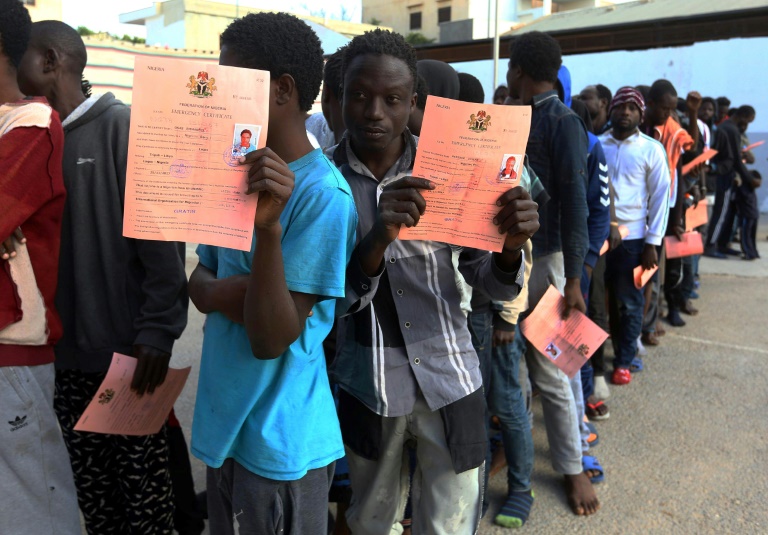Libya's UN-backed authorities said Tuesday that flights repatriating stranded migrants will be stepped up, as the International Organization for Migration called on Tripoli to empty its detention centres.
The plight of migrants in Libya has garnered fresh attention after an outcry over reports of slave auctions in the country, an enormous transit hub for sub-Saharan Africans seeking to reach Europe.
Human-trafficking networks have flourished in the chaos that followed a NATO-backed uprising which toppled long-time Libyan dictator Moamer Kadhafi in 2011.
In a joint operation involving the internationally recognised authorities and UN migration agency, the IOM, 140 Nigerian migrants were jetted out of Libya on Tuesday in the latest in a string of flights carrying migrants out of the country.
At the Tarik al-Sikka detention centre in downtown Tripoli the migrants received their temporary travel documents, clothing and food before being bussed to the airport.

Nigerian migrants wait to be repatriated by plane from Libya on 28 November, 2017
Hosni Abou Ayana, spokesman for the authorities’ anti-human trafficking office, said the “voluntary repatriation” involved 70 women and 28 children and that the plane was provided by the IOM.
Flights would increase from two to four times a week in agreement with the UN agency, he said, adding that some 9,700 people had been repatriated from Tarik al-Sikka so far this year.
The latest repatriation came as the head of the IOM called on the authorities in Tripoli to agree to shut down 30 detention centres holding 15,000 migrants.
“We need from the Libyans the agreement that we can empty these centres, and I think they will agree to that,” William Lacy Swing told a meeting of the UN Security Council.
The detention of the migrants, most of whom are fleeing poverty, has become a pressing issue since CNN aired video footage of an apparent auction of African men in Libya that sparked global outrage.
Libya’s UN envoy rejected the report of the slave auctions as a campaign to portray the country as racist and accused African governments of failing to take responsibility for the well-being of their citizens.
Since the ouster of Kadhafi in 2011, the North African country has been ripped apart by conflicts between multiple militias and two rival governments.






